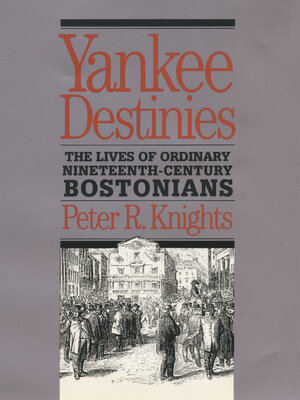
Sign up to save your library
With an OverDrive account, you can save your favorite libraries for at-a-glance information about availability. Find out more about OverDrive accounts.
Find this title in Libby, the library reading app by OverDrive.



Search for a digital library with this title
Title found at these libraries:
| Library Name | Distance |
|---|---|
| Loading... |
This book reconstructs important milestones in the lives of 2,808 white, native-born men who resided in Boston, Massachusetts, in 1860 or 1870. Selected systematically from the census for those two years, these men represent two cross-sections of those viewed by contemporaries as "typical" Bostonians.
Using a broad array of sources—manuscript census returns; tax assessments; city directories; birth, marriage, and death records for more than twenty states; cemetery records; newspapers; and family genealogies—Peter Knights traced these men not only back to their origins in hundreds of small New England towns but also (for those who left) onward from Boston. He determined changes in their occupations and wealth and after they arrived in Boston, the fates of their marriages, their production of children, and—in all but seventy cases—their deaths and the causes thereof. The result is a comprehensive quantitative study of important aspects of the lives of what are probably the largest sample population groups for any North American community.
Using a broad array of sources—manuscript census returns; tax assessments; city directories; birth, marriage, and death records for more than twenty states; cemetery records; newspapers; and family genealogies—Peter Knights traced these men not only back to their origins in hundreds of small New England towns but also (for those who left) onward from Boston. He determined changes in their occupations and wealth and after they arrived in Boston, the fates of their marriages, their production of children, and—in all but seventy cases—their deaths and the causes thereof. The result is a comprehensive quantitative study of important aspects of the lives of what are probably the largest sample population groups for any North American community.







